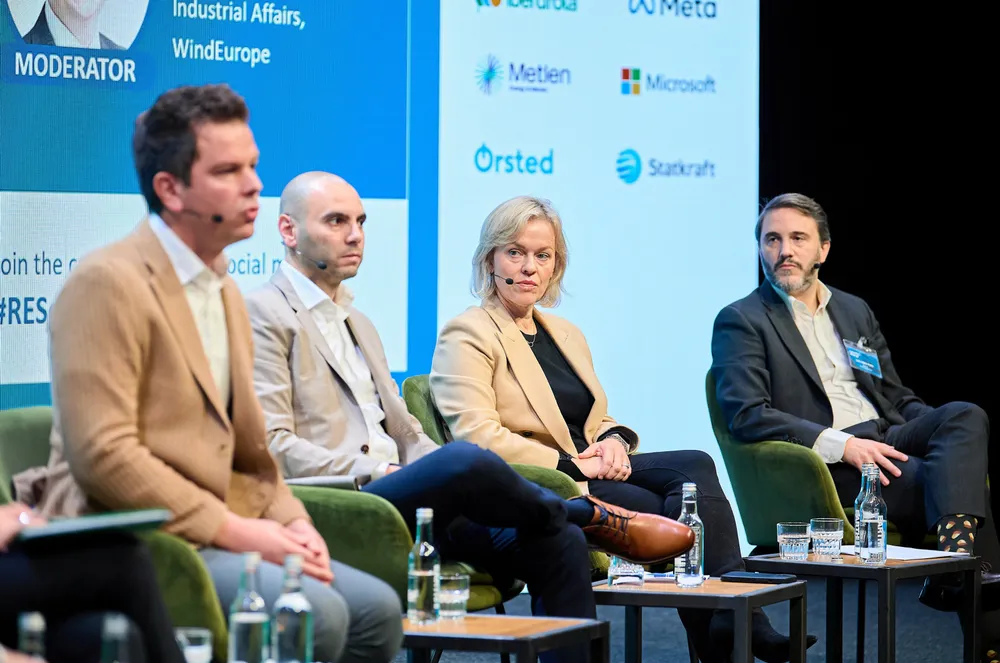Experts weigh ‘the good, the bad and the ugly’ of renewable power deals
Corporate PPAs for green power are reaching record levels of popularity, but panel of experts highlighted such deals bring risks for buyers and sellers

Damaged reputations, angry locals and parties “chickening out” at the last minute are all risks when negotiating green Power Purchase Agreements (PPAs), said a panel of industry experts who gave their top tips on how developers and offtakers can avoid such dangers.
Corporates have already inked 10.7GW of PPAs with renewables developers in the European market this year, with the continent set to smash its previous annual record for such deals – 10.8GW – set in 2023.
Being the number one seller entails many successes in the market, but also “a lot of failures,” its head of European sales & origination Stephane Pirotte told the RE-Source 2024 conference for corporate green power procurement in Amsterdam on Friday.
Pirotte said that Engie sees “the good, the bad and the ugly” when negotiating such deals with corporates, not all of which have the experience of the US tech giant in the sector.
His advice for corporates is that they should be as precise as possible about the green technology they are after when sending requests for proposals to developers – whether it be onshore wind, offshore or solar.
They must also be conscious that if they want a “premium product,” which could be an already permitted wind farm, they will be in competition with “best-in-class corporates” after the same asset.
“So it has an impact on the price,” he said. It may be “very tempting” to go for the best product, but the response from the developer “could be a little bit discouraging.”
Developers need to “switch mindset from a client-supplier perspective” to a “partnership perspective,” said Pirotte. Another tip he offered is that signing a PPA is “not a race,” and that continuous dialogue is essential.
Without such dialogue, a developer may suffer the same fate Engie has previously, a deal falling through due to corporates “chickening out” at the last hurdle.
Patricia Blanco Fernández, an account manager for corporate customers and PPAs at Iberdrola, said it is important to “go backwards” from the date you need the energy to help you decide when to start the PPA process, given these contracts can take months to negotiate.
Other key questions for a corporate to ask itself are the capacity it is seeking and if it needs flexibility. A corporate must also consider if there’s an “additionality aspect” that needs to be taken into account – whether it is important to “sponsor” a new asset.
Luis López-Polín, buyer engagement director at LevelTen Energy, which provides transaction infrastructure for corporate PPAs, said that it is crucial for corporates to have data on market prices for power before entering deals.
But price is not necessarily the most important criteria, he said, stressing the importance of focusing on the overall value offered by a deal.
Ouafik El Kasmioui, group energy & utilities manager at Austrian plastics manufacturer Borealis, said that his company decided to develop its expertise in-house when it comes to negotiating PPA contracts; although it did engage an external law firm to help with the “nitty gritties.”
Natasha Luther-Jones, global co-chair of the Energy & Natural Resources Sector at DLA Piper, said her law firm decided to “lead from the front” by signing its own corporate PPA, a multi-jurisdictional virtual agreement.
Luther-Jones said it is “not surprising” that she advocates corporates getting legal advice early in the process, at least for “informal chats," as PPAs are a “unique” legal area that in-house legal teams may not be familiar with.
Corporates must also carefully consider what they do, and don’t, include in the heads of terms in PPA negotiations, she said.
In many countries they will be competing against national renewables auctions, she said. “If you take too long to negotiate your heads of terms,” sellers might decide they’re better off taking that other route.
It is best not to raise new points during the process “unless they’re absolutely critical,” she said, as these will cause delays.
When PPA negotiations do fail at the final hurdle, she said it’s often down to not having settled issues that “should have been dealt with upfront,” or otherwise a “lack of engagement” with the chief financial officer at the buyer.
When it comes to due diligence, Luther-Jones said it is crucial to “dig deep” into the counterparty before signing a long term PPA for them in case they pose a “reputational risk for you.”
Due diligence on the counterparty’s supply chain is also important, she said. Corporates should tell developers up front “what’s going to be expected” from them in this regard and whether the standards they comply with are sufficient.
It’s also important to check the planning consent process for the asset if it is still in development and see if there is much local opposition, she said.
Signing a green PPA for a corporate should be a “good news story,” but a corporate tying itself to an asset in conflict with angry locals could she said turn it into a bad one.
(Copyright)